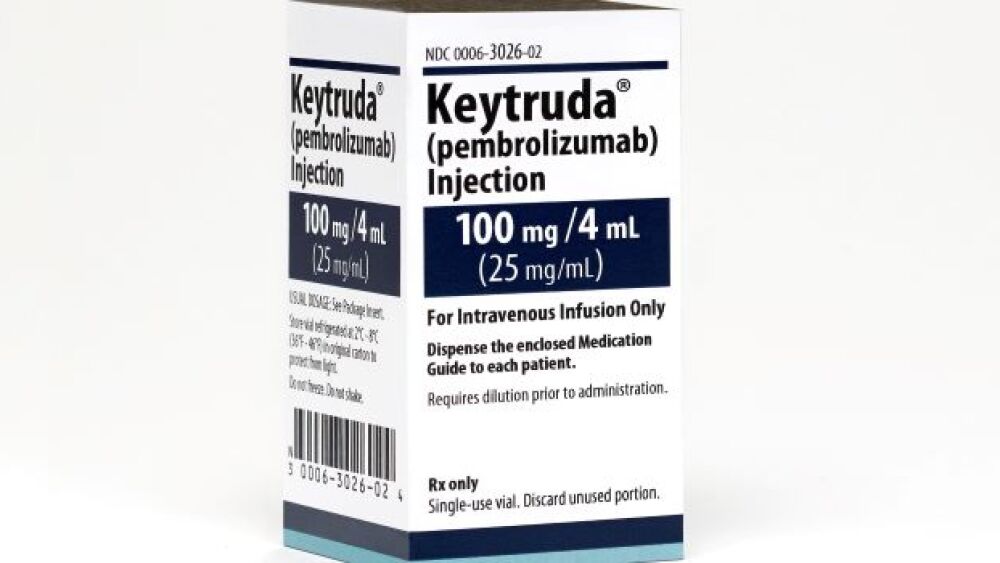Merck and Eisai announced today that they have new investigational data demonstrating positive top-line results from the Phase III KEYNOTE-581/CLEAR trial (Study 307).
Image: Copyright © 2009-2020 Merck Sharp & Dohme Corp., a subsidiary of Merck & Co., Inc., Kenilworth, N.J., U.S.A. All rights reserved.
Merck, also known as MSD outside of the U.S. and Canada, announced along with Eisai today that it has new investigational data demonstrating positive top-line results from the Phase III KEYNOTE-581/CLEAR trial (Study 307).
The trial looked at a combination of Keytruda from Merck and Lenvima from Eisai for the treatment of advanced renal cell carcinoma (RCC). Lenvima plus everolimus was also evaluated versus sunitinib.
According to the data, Keytruda and Lenvima were able to meet the trial’s primary endpoint of progression-free survival (PFS) and its secondary endpoints of overall survival (OS) and objective response rate (ORR). Together, they demonstrated a statistically significant and clinically meaningful improvement in PFS, OS and ORR versus sunitinib in the intention-to-treat (ITT) study population.
“The results for KEYTRUDA plus LENVIMA versus sunitinib, which showed a statistically significant improvement in progression-free survival, overall survival and objective response rate, build on the growing scientific evidence that supports the investigation of KEYTRUDA-based combinations for the first-line treatment of advanced renal cell carcinoma,” said Dr. Gregory Lubiniecki, Associate Vice President, Oncology Clinical Research, Merck Research Laboratories. “Merck and Eisai are committed to working together to continue to explore the potential of the KEYTRUDA plus LENVIMA combination, particularly in areas of great unmet need such as renal cell carcinoma.”
The safety profiles of Keytruda and Lenvima, along with Lenvima plus everolimus, were consistent with previously reported studies. Merck and Eisai intend to discuss their new data with global regulatory authorities, with the intent to submit marketing authorization applications based on these results.
“The results from KEYNOTE-581/CLEAR (Study 307) support the potential use of KEYTRUDA plus LENVIMA for the first-line treatment of advanced RCC. These data also support the potential first-line use of LENVIMA plus everolimus, which is already approved in advanced RCC following prior antiangiogenic therapy,” said Dr. Takashi Owa, Vice President, Chief Medicine Creation and Chief Discovery Officer, Oncology Business Group at Eisai. “These findings energize our efforts as we continue to advance our understanding and address the unmet needs of patients with difficult-to-treat cancers.”
This is not the first batch of data to demonstrate the potential of Keytruda in combination with another drug. Merck has been exploring Keytruda and ipilimumab as a first-line treatment of patients with metastatic non-small cell lung cancer (NSCLC).
However, the company recently decided earlier this month to discontinue the study at the recommendation of an independent Data Monitoring Committee (DMC). After an interim analysis, it appeared that Keytruda and ipilimumab did not benefit OS or PFS in subjects.
“We conducted KEYNOTE-598 in order to explicitly explore whether combining our anti-PD-1 therapy, KEYTRUDA, with ipilimumab provided additional benefits beyond treatment with KEYTRUDA alone in the metastatic non-small cell lung cancer setting,” said Dr. Roy Baynes, senior vice president and head of global clinical development, chief medical officer, Merck Research Laboratories. “It is very clear that in this study, the addition of ipilimumab did not add clinical benefit but did add toxicity. KEYTRUDA monotherapy remains a standard of care for the treatment of certain patients with metastatic non-small cell lung cancer whose tumors express PD-L1.”
At the moment, Keytruda is recommended for several indications, including melanoma, non-small cell lung cancer, head and neck squamous cell cancer and gastric cancer. The product is an anti-PD-1 therapy that works by increasing the ability of the body’s immune system to help detect and fight off tumor cells.





